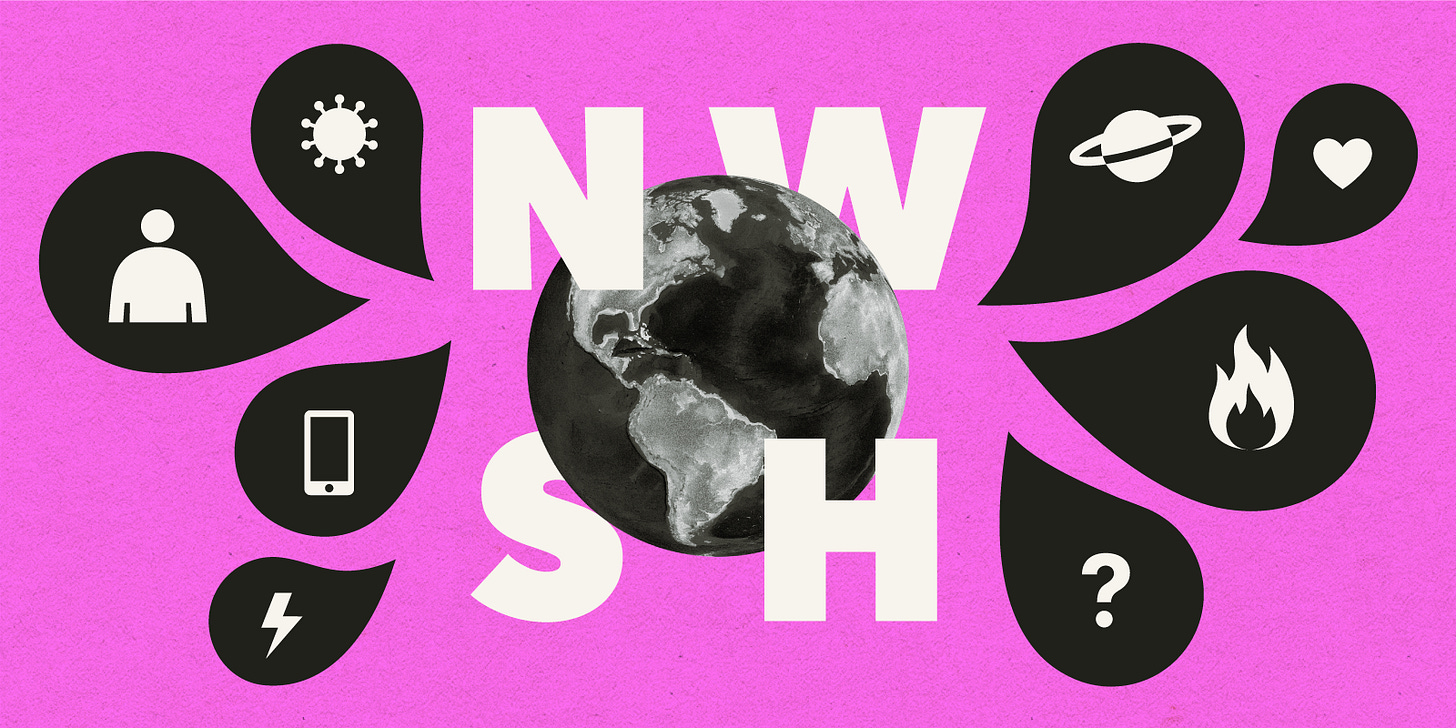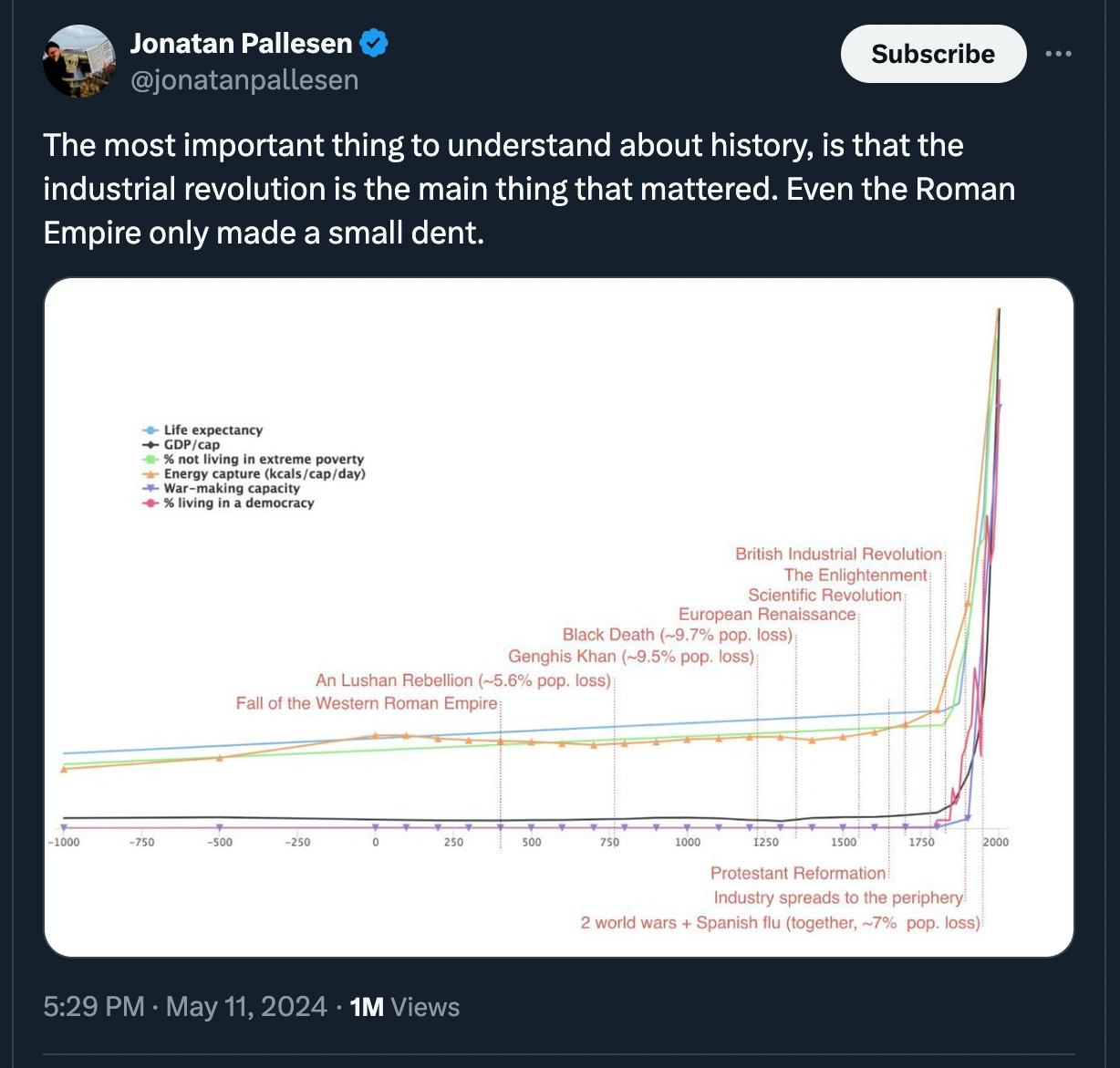New Week #134
AI-fuelled virtual companions are about to take centre stage.
Welcome to this update from New World Same Humans, a newsletter on trends, technology, and society by David Mattin.
If you’re reading this and haven’t yet subscribed, join 25,000+ curious souls on a journey to build a better future 🚀🔮
To Begin
This week, further news on the looming partnership between OpenAI and Apple has me thinking about a long-standing NWSH obsession. I mean AI-fuelled virtual companions.
Also, the intriguing Fable Studios has a vision of a whole new kind of TV. And a compelling chart sparks further thoughts on the technological singularity.
Let’s get into it.
✨ One Ring to Rule Them All
This week, fresh news that we’re close to a mega-partnership between OpenAI and Apple.
According to Bloomberg, who were the first to break this story last month, the partnership will be announced at Apple’s World Wide Developer Conference (WWDC) next week.
This comes weeks after OpenAI launched GPT-4o, its latest and most versatile model. I gave some first thoughts on that launch, and what it signals about the broader state of AI, in this video instalment of the newsletter.
If the demonstrations are anything to go by, users can hold a fluent and natural conversation with GPT-4o. The model is also able to understand video input in real-time, meaning it can, for example, take a look at the room you’re sitting in and use that as context against which it will frame its responses: it looks as though you’re in a science lab — what are we working on?
We know what OpenAI CEO Sam Altman is aiming at:
That’s a reference, of course, to the AI-fuelled virtual companion in the 2013 film Her. Altman is making a play for that kind of product: and he wants his to be the One Companion to Rule Them All.
Virtual companions are a long standing NWSH obsession. I’m talking here about the rise of the AI guide, counsellor, philosopher, and friend. Back in 2020 I wrote about the coming journey of the virtual companion from weird to mainstream.
Now, via this looming partnership between OpenAI and Apple, it looks as though that moment has come.
⚡ NWSH Take:
A few years ago it was easy to dismiss the whole idea of virtual companions as nothing more than a curiosity fuelled by a few teenagers. I’d talk to leaders inside large organisations and say: people will develop a new kind of relationship with these AI entities. Some of them would laugh.
And I get it.
It’s always hard to believe that a behaviour on the fringe — a behaviour that seems weird — can become mainstream. But remember, 20 years ago the early social media platforms were seen as little more than toys for college students. Now, they’re daily life for billions.
We’re going to go on the same journey with virtual companions. And OpenAI are making a giant play to own that journey.
We don’t know what form the coming partnership between that company and Apple will take. But at WWDC next week, we may well see Tim Cook stand on stage and announce that GPT-4o has been integrated across iOS as a kind of on-device virtual companion.
That will give OpenAI near-instant access to 1.5 billion pockets around the globe. And it will shove virtual companions firmly into the mainstream.
Across the coming years, these companions will become an all-purpose mediation layer between you and the world around you. First, your virtual companion will gather information, interpret the world for you, and help you manage your health, personal finances, and more. Soon enough, you’ll be outsourcing daily lifestyle tasks to your personal AI: order my groceries, book me that city break we talked about, manage my investments.
That will transform your relationship with the techno-consumerist megasystem you live inside. And it will force brands to adapt or die.
Ultimately, millions will come to feel that they are in some kind of relationship with their virtual companion. That it is an authentic form of intelligence in its own right, with its own way of seeing the world.
In short, things are going to get weird. And it could all start in earnest next week. I’ll be keeping a close eye on the WWDC.
🗓️ Also this week
📺 AI startup Fable Studios announced a new platform that allows users to create their own TV shows populated by AI-simulated characters.
Fable Studios made headlines last year when it showcased an full-length and AI-generated episode of South Park.
Now, it says its new Showrunner platform allows users to create entire TV shows of their own devising via natural language prompts.
Eventually, says Fable, the Showrunner platform will function as an ‘AI Netflix’: instead of choosing a show to watch, simply describe the show you’d like to watch and the Showrunner simulation platform will generate it for you.
Right now, a small number of alpha users are able to create shows within existing Fable Studios simulations, including Sim Francisco: a simulation of Silicon Valley populated by thousands of AI-generated characters.
My take? The rise of simulated societies of this kind will be a revolution not only for entertainment, but for sociology and our ability to study collective human behaviours.
I’m still obsessed with this research paper in which researchers at Stanford and Google created a simulated mini-town called Smallville, and asked the 25 AI inhabitants to organise a birthday party:
We’re going to see much more of all this. Simulated hospitals, factories, and eventually entire simulated nations filled with millions of AI agents. I’ll be writing more soon.
💥 This tweet captures the incredible liftoff — in everything from life expectancy to GDP to energy capture — that began with the Industrial Revolution.
It was published a few weeks ago but caught my eye this week — that’s still within the rules of New Week, right?
Essentially, this is the phenomenon I was writing about in the long essay I published here recently called The Singularity is Now.
In that essay I argued that the ongoing Industrial Revolution is the Technological Singularity as described by John von Neumann, the originator of that idea. That is to say, it is an event so transformative that all the old rules that once governed our collective existence break down.
In this tweet’s comments thread there are some great counter-arguments. Mostly along the lines of: but even the Industrial Revolution was only the continuation of long-run underlying trends.
This argument has much in its favour. No historical event comes out of nowhere. But I’d argue that at some point the underlying structural forces that drove the Industrial Revolution coalesced in such a way as to produce something new; something singular.
The controversial British philosopher of acceleration Nick Land is interesting on all this. He models capitalist techno-modernity as a possibility that was always latent in our collective existence. For most of our history, says Land, society acted to contain the explosive potential of modernity. But eventually, during the Renaissance, those forces of containment fell away and the result was a positive feedback loop that Land compares to a nuclear fission reaction. That conversation is here; see the section time-stamped ‘intelligence explosion’.
Ever-more of my independent writing circles around the same question. That is, how best to model the moment, the epoch, we find ourselves in. On the one hand technological modernity seems a startling interruption, a kind of species-wide liftoff moment. Seen from a different perspective, it’s only another chapter in a long and shapeless narrative; just one thing after another.
I think the struggle to reach a better understanding of all this will be the work of a lifetime. In any case, I feel a follow-up essay coming on.
We Have Liftoff
Thanks for reading this week.
I’ll be watching Apple’s WWDC closely, and I’ll be back next week to discuss the news.
Now you’ve reached the end of this week’s instalment, why not forward the email to someone who’d also enjoy it? Or share it across one of your social networks, with a note on why you found it valuable. Remember: the larger and more diverse the NWSH community becomes, the better for all of us.
See you next week with another postcard from the new world. Until then, be well,
David.







Re: “researchers at Stanford and Google created a simulated mini-town called Smallville, and asked the 25 AI inhabitants to organise a birthday party”, I’m way less optimistic than you are.
This is basically what’s called “agent based modeling” in complex adaptive systems circles. For example, SFI’s Complexity Explorer has offered courses using NetLogo programming for years. While simulations can layer in more complex rules and numbers of agents, the main shortcoming is that it’s nothing like the predictive modeling most people expect.
Initial conditions and the non-linear, emergent, and self-organizing behaviors can create very different outcomes with each simulation run. The best predictive analyses thus come down to Monte Carlo-level mass simulations, hoping to draw out some select aggregation of scenarios happening more probabilistically than others. Thus it’s less like predicting the weather and more like the ever-flawed AI simulations of who will win the World Cup - the latter of which is frequently outdone by octopuses and armadillos.
I sincerely doubt this is the anticipated outcome you’re excited about. But there’s still magic in the uncertainty despite our best analytical efforts.